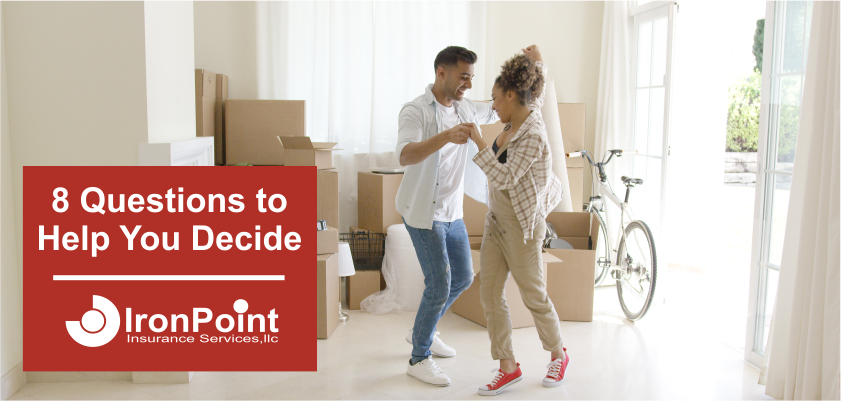Ready to Buy A House? 8 Questions to Help You Decide

So lately you’ve found yourself asking, “am I ready to buy a house?” Homeownership is a major milestone that many people dream of reaching one day. However, there are a variety of factors to consider when making one of the biggest financial decisions of your life.
So, if you’ve been thinking about becoming a homeowner, but aren’t sure if you’re prepared, you’ve come to the right place. We’ve laid out 8 questions to help you decide if you’re finally ready to buy a house. See how many you can answer yes to and if now is the right time for you to begin your homebuying journey.
1. Do you have money for a down payment?
Although the common perception is that first-time homebuyers need to have a 20% down payment to purchase a home, that’s simply not the case. Typically you’ll need a minimum down payment of 3.5% to 10% for an FHA home loan, and a minimum of 3% to 5% for a conventional loan.
For example, let’s assume you’d like to purchase a home that costs $300,000. Your lender will require a downpayment of at least 3% of the sale price of the home, depending on the type of loan you choose and qualify for. In this example, 3% of $300,000 equals a $9,000 down payment.
It’s important to remember that the larger your down payment, however, the lower your monthly payments will be and the less interest you will pay during the life of your loan. Another drawback to a low down payment is that you’ll have to pay private mortgage insurance (PMI), which protects your lender in case you can’t pay your mortgage. If you put down less than 20%, you’ll probably have to pay for PMI, which is added to your monthly mortgage payment.
2. Do you have a solid savings and emergency fund?
While you may have saved enough for your down payment, don’t forget to account for closing costs which include legal fees, lender fees, taxes, etc., and usually total 2% to 5% of the home’s purchase price. Also, during the home inspection, you may find a few home maintenance items that you’ll want to take care of sooner rather than later, such as a leaking septic tank or cracks in the walls or ceilings. This is when additional savings will come in handy.
You should also make sure you have some emergency funds set aside. When you’re renting, you have the wonderful luxury of calling up a landlord whenever there are issues with the property. So when the heater stops working in the middle of winter, you don’t have to spend thousands of dollars to fix it. Or, when your washing machine breaks during a cycle, you won’t be responsible for calling a repairman to take a look. But once you become a homeowner, all of that responsibility falls on you. So, if you’re going to burn through your savings on a down payment, hold off on buying a house until you have a larger safety net.
3. Is your credit score in pretty good shape?
Many potential homebuyers worry that they won’t be able to buy because of a low credit score. However, you actually don’t need perfect credit to buy a home and there are many loans and first-time homebuyer programs available for buyers without perfect credit. That being said, a higher score will help you qualify for a lower mortgage rate, saving you money in the long run.
One of the most common questions first-time buyers ask is, “what credit score is needed to buy a house?” While there’s no hard-and-fast rule for this, you’ll likely need a minimum credit score of 600 for approval. To qualify for the most favorable rate, however, work on improving your credit score and wait until you have a score of 700 or higher.
4. Do you have a handle on your debt?
Don’t panic – you don’t have to be completely debt-free to buy a home. Between student loans, car payments, and other bills, most mortgage companies know that it is unrealistic to expect borrowers to be totally debt-free these days. They primarily want to know that you’ll be able to afford your mortgage payment based on how much money you have coming in versus what you need to pay out to other debts.
To figure this out, lenders will look at your debt-to-income ratio, which is an estimation of how much of your monthly income goes towards debt payments. To find your current ratio, you can use a debt-to-income ratio calculator. So long as your debt ratio is at least 43% you can still qualify for a mortgage.
5. Have you crunched the numbers to make sure you can afford the monthly expenses?
To figure out if you can afford the monthly expenses, you’ll first need to calculate your mortgage payment. An online mortgage calculator can estimate this for you, however, affording a home is so much more than just the mortgage payment. Other financial aspects of homeownership may include:
- Property taxes and insurance
- Home Owner Association (HOA) fees, if applicable
- Home expenses (sewage, garbage, internet, etc)
- Utilities (water, electricity, etc.)
Before you decide to make the transition from renting to buying a house, make sure you’ve done the math and can afford all of the monthly expenses that come with being a homeowner.
6. Do you have a steady job?
Stable employment and income show lenders how much house you can afford and are important indicators for qualifying for any mortgage. But even if you can demonstrate financial stability on paper, you should only buy a house if you think your income will remain steady for the foreseeable future.
A nightmare scenario for most homebuyers is losing their job just after they close or move into a new home. So if there’s any uncertainty about your income or employment, wait until things settle down before buying a house.
7. Do you need more space?
While money is obviously an important consideration, there are many other factors to think about when asking, “am I ready to buy a house?” One of which is the thing we all seem to need more of currently – space.
With so many of us spending most of our time at home, maybe you desperately need a designated home office or an extra room for a home gym? You may want a larger backyard or an area for a garden. Do you have kids or are you expecting a baby soon and you need more room? If this sounds like you, then now may be the time to consider buying a home.
8. Are you planning on staying put for a while?
There’s no rule barring you from moving shortly after buying a home. But as a homeowner, you’ll have a chance to build equity. The longer you own your home, the more equity you build, and the more money you’re likely to make when you sell it. Ideally, you should live in a house long enough to make a profit. So, if you can’t commit to an area, continue renting until you’re ready to put down roots.
Figuring out if you are ready to buy a house is a personal decision and one that means taking a hard look at different aspects of your life: finances, lifestyle, job situation, and long-term goals. But if you’ve answered yes to all of the above, you might just have an answer to the big question, “am I ready to buy a house?” If you’re still unsure or you have specific questions relating to your situation, reach out to a mortgage lender or real estate agent who can give you professional advice.
This post was originally published on www.redfin.com. You can see it here.

Compare Quotes Online
Want to know if you can save on home or auto insurance? See for yourself. Start a quote today.
Give us a Ring
1-877-334-7646
Call today and speak with a professional insurance agent.